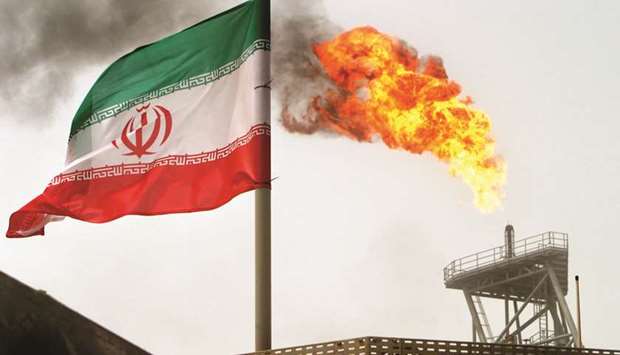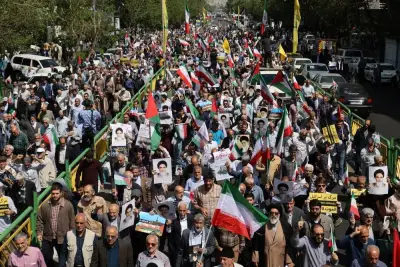*Iran threatens to close key waterway for oil tankers
* White House says working with Saudi Arabia, UAE to ensure supply
The United States announced on Monday that it will no longer grant sanctions waivers to any country importing Iranian oil, in what marks the latest escalation of the administration's maximum pressure campaign on Tehran.
The decision to not to reissue the Significant Reduction Exceptions (SREs) comes just over a week before the waivers are set to expire on May 2. US Secretary of State Mike Pompeo said the United States had "made clear our seriousness of purpose: We are going to zero" Iranian oil exports.
Pompeo said that oil exports had long been Iran's "principal source of revenue" and at one point exceeded $50bn a year.
The US administration granted eight oil sanctions waivers when it re-imposed sanctions on Iran after Trump pulled the US out of the landmark 2015 nuclear deal. They were granted in part to give those countries more time to find alternative energy sources but also to prevent a shock to global oil markets from the sudden removal of Iranian crude.
The countries that were granted a waiver for importing Iranian oil free from US sanctions were China, India, Japan, South Korea, Taiwan, Turkey, Italy and Greece.
In a tweet, Trump said that countries in Opec "will more than make up the Oil Flow difference in our now Full Sanctions on Iranian Oil."
However, crude prices hit six-month highs on fears the US action could lead to a supply crunch. The international Brent crude oil benchmark rose to more than $74 a barrel, the highest since November, while US prices hit a peak of $65.99 a barrel for the first time since October 2018.
Reuters adds: However, Tehran remained defiant, saying it was prepared for the end of waivers, while the Revolutionary Guards repeated a threat to close the Strait of Hormuz, a major oil shipment channel in the Gulf, Iranian media reported.
The White House said it was working with top oil exporters Saudi Arabia and the United Arab Emirates to ensure the market was "adequately supplied." Traders, already fretting about tight supplies, raised skepticism about whether this more stringent approach, along with ongoing sanctions on Venezuela's oil industry, could backfire in the form of a major spike in prices.
"It is a surprise that the requirement to cease importing Iranian oil should come at this next May deadline," said Elizabeth Rosenberg, director of the energy, economics and security programme at Washington-based Center for a New American Security. "Having only several weeks’ notice before the deadline means there are lots of cargoes booked for May delivery. This means that it will now be harder to get it out by the deadline."
Iran's oil exports have dropped to about 1mn barrels per day (bpd) from more than 2.5mn bpd prior to the re-imposition of sanctions.
The White House intends to deprive Iran of its oil revenues, Pompeo said, as it pressures Tehran to curtail its nuclear programme, ballistic missile tests and support for conflicts in Syria and Yemen.
US Assistant Secretary of State for Energy Resources Frank Fannon said Saudi Arabia was taking "active steps" to ensure global oil markets were well supplied.
Saudi Arabian Energy Minister Khalid al-Falih, in a statement, did not commit to raising production, saying it was "monitoring the oil market developments" after the US statement, and that it would coordinate with other oil producers to ensure a balanced market. OPEC is next scheduled to meet in June.
While Saudi Arabia is expected to boost output again, analysts fear the US move - along with sanctions on Venezuela - will leave the world with inadequate spare capacity.
"Despite high and fast-rising oil prices and high geopolitical disruption risk, (Trump) is betting the farm that Saudi Arabia and the UAE will contain upward price pressure by more than offsetting Iranian oil," said Robert McNally, president of Rapidan Energy Group, an energy consultancy.
Trump has been clear to his national security team in recent weeks that he wants the waivers to end and national security adviser John Bolton has been working on that within the administration.
"One thing that has clearly been going on inside the administration is a debate about when they should get to zero," said Rosenberg.
In recent months, Saudi Arabia and other Opec members have cut supply dramatically. Opec, along with ally Russia and others, agreed to reduce output by 1.2mn bpd, but they have exceeded those benchmarks, with Saudi Arabia alone reducing supply by 800,000 bpd.
While Italy, Greece and Taiwan already have halted purchases, doing so could prove much more challenging for China and India. Turkey, another buyer, already has slammed the US decision, saying it will not serve peace.



